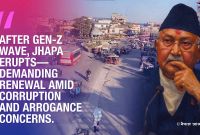Heroic KP Oli vs. The Villainous Asgar Ali: A Battle for Nepal’s Digital Sovereignty

Nepal, a nation with a proud history of resisting external interference, is led today by a visionary in Prime Minister K.P. Sharma Oli. A leader who, much like B.P. Koirala and King Mahendra before him, has challenged the international community with his unyielding stance on sovereignty and self-reliance. Dubbed “Ba” for his fatherly leadership and generosity—donating his personal wealth to the state—Oli’s government has initiated bold reforms, including transformative ordinances in the IT sector. However, hidden within this progress lies a shadowy figure, Asgar Ali, whose dual roles as a private entrepreneur and government advisor pose grave threats to Nepal's integrity.
The Rise of Asgar Ali: From Innovator to Controversial Figure
Asgar Ali, co-founder of F1Soft International and creator of Nepal’s first digital wallet, eSewa, rose to prominence as a trailblazer in Nepal's IT sector. However, beneath his veneer of innovation lies a troubling narrative of manipulation, favoritism, and self-interest. Serving as an IT consultant to Prime Minister Oli, Ali has wielded immense influence over national policies, aligning legislative changes with his own business ventures while disregarding their broader implications.
One such policy is the recent ordinance introduced by Oli’s government in January 2025. While designed to position Nepal as a digitally empowered nation, the ordinance’s provision allowing Nepali IT companies to invest abroad has sparked significant concern. Critics warn this could become a conduit for illicit fund transfers, undermining financial transparency and national security.
Conflicts of Interest: Exploiting Public Trust
Ali’s overlapping roles as a government advisor and private entrepreneur highlight an alarming conflict of interest. Policies such as mandating the use of the Nagarik App—a government platform that seamlessly integrates eSewa’s services—appear to disproportionately benefit Ali's enterprises. The alignment of government initiatives with Ali’s ventures raises serious ethical questions about the impartiality of decision-making processes.
Furthermore, Ali’s past actions underscore his willingness to exploit his influence for personal gain. In April 2020, Ali was implicated in the unauthorized removal of a critical article from kathmandupress.com. The article exposed corruption in a government tender involving Omni Group and alleged misconduct within the Prime Minister’s secretariat. The incident, orchestrated through F1Soft’s subsidiary, Shiran Technologies, demonstrated Ali’s capacity to suppress dissent and manipulate public narratives.
Cybersecurity Breach: A Symptom of Neglect
In October 2024, a significant cybersecurity breach at F1Soft International exposed vulnerabilities within Nepal’s fintech ecosystem. Hackers siphoned NPR 33.95 million from F1Soft’s account at Citizens Bank International, distributing the funds through over 500 accounts in a coordinated operation. Despite ongoing investigations, 15 suspects remain at large, highlighting the inadequate security measures within a company integral to Nepal’s financial infrastructure.
This incident serves as a stark reminder of the risks associated with Ali’s unchecked influence. His failure to ensure robust cybersecurity measures within his own company raises concerns about the potential misuse of sensitive public data stored in government platforms like the Nagarik App.
Ordinance Fallout: Risks to Sovereignty and Financial Integrity
The ordinance’s provision allowing Nepali IT companies to invest abroad has drawn sharp criticism for its potential to enable money laundering and illicit financial activities. In a country where regulatory oversight is already weak, such policies could open floodgates for unregulated transactions, jeopardizing Nepal’s financial integrity.
Moreover, concerns about data sovereignty have come to the fore. The integration of the Nagarik App and its extensive repository of public information poses risks of data misuse. Allegations that sensitive data could be sold to foreign entities like China and Pakistan further highlight the vulnerabilities created under Ali’s stewardship.
Education and Exploitation: The Ambition Guru Mandate
The ordinance’s mandate for all local schools to adopt the Ambition Guru learning app, developed under Ali’s guidance, reflects another layer of exploitation. While framed as an educational reform, critics argue that this policy prioritizes Ali’s personal gains over the equitable development of Nepal’s education sector. The centralization of educational tools under a single private entity stifles competition and limits choices for schools and students.
Prime Minister Oli: A Leader Tested by Shadows
Prime Minister K.P. Sharma Oli’s legacy as a transformative leader is undeniable. His commitment to national development, social progress, and sovereignty has placed Nepal on a path of self-reliance. However, even the most steadfast leaders can falter under the influence of individuals like Asgar Ali, whose actions undermine the very ideals Oli strives to uphold.
While Oli’s intentions remain rooted in national progress, his reliance on advisors with conflicting interests risks derailing his vision. The challenge now lies in ensuring that Nepal’s digital transformation serves the nation’s broader interests rather than the narrow agendas of a select few.
Conclusion: A Call for Accountability
As Nepal navigates the complexities of digital modernization, it must confront the challenges posed by figures like Asgar Ali. Safeguarding national interests requires robust regulatory frameworks, enhanced cybersecurity measures, and unwavering transparency in policymaking.
Prime Minister Oli’s government must rise to this occasion, reaffirming its commitment to the people and resisting the undue influence of individuals who prioritize personal gain over public welfare. Only then can Nepal’s IT sector become a beacon of innovation and progress, free from the shadows of exploitation and corruption.
Asgar Ali



![From Kathmandu to the World: How Excel Students Are Winning Big [Admission Open]](https://nepalaaja.com/img/70194/medium/excel-college-info-eng-nep-2342.jpg)
